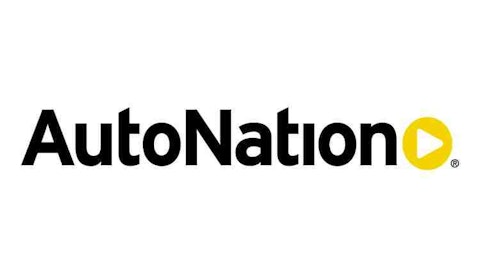As the economic recovery continues to chug along it seems likely that pent-up demand will benefit certain sectors of the economy. Specifically, consumers may be ready to consider buying larger items that they postponed purchasing due to economic concerns. With the current rebound in the stock and housing markets, many consumers are feeling wealthier and more secure, which may translate into increased consumer spending.
While the U.S. auto market has seen good momentum over the past several years (Figure 1), the average age of a vehicle on the road remains at an all time high of over 11 years. Due to this fact, auto-parts dealerships such as AutoZone, Inc. (NYSE:AZO) and Advance Auto Parts, Inc. (NYSE:AAP) have been strong performers coming out of the recession. However, if consumer spending continues to improve, the conditions seem ripe for a transfer of leadership from auto parts chains towards dealerships that profit from the sale of new and used automobiles. Several names in this space include AutoNation, Inc. (NYSE:AN), CarMax, Inc (NYSE:KMX) and Penske Automotive Group, Inc. (NYSE:PAG).

Several other factors should provide notable tail winds for new car sales. First, the cost of financing for the purchase of a new car remains extremely low at below 5% (Figure 2). Second, the comparative cost of purchasing a used vehicle is very high relative to a new vehicle. As consumers have become more cost-conscience and have driven their cars longer, the combination of tightening supply and increased demand has pushed prices for used cars to very high levels relative to new cars. In total, there has probably never been a better time to purchase a new car–thus the market should continue to be robust.

Indeed, both General Motors Company (NYSE:GM) and Ford Motor Company (NYSE:F) reported increasing year over year sales in the high single digits this February (9% and 7%, respectively). Considering the harsh winter weather on the east coast compared to the milder weather from 2012, this trend seems all the more impressive.
The table below provides a comparison of key statistics for the five stocks mentioned above. AutoZone, Inc. (NYSE:AZO) and Advance Auto Parts are in a somewhat different sub-industry and boost superior profit margins. Among the auto parts dealerships AutoNation, Inc. (NYSE:AN) and Penske Automotive (NYSE:PAG) have comparable margins, but AutoNation boosts a larger market capitalization and a superior return on equity. During the prior five year run for auto parts shops, AutoZone, Inc. (NYSE:AZO) boasted superior total returns compared to Advance Auto Parts, in part due to its larger size leading to economies of scale and improving profit margins. Thus, it seems likely that AutoNation, Inc. (NYSE:AN) may have similar benefits and is my favorite pick within the group.
| AAP | AN | AZO | KMX | PAG | |
|---|---|---|---|---|---|
| Market Cap | $6.063 billion | $5.327 billion | $14.65 billion | $9.541 billion | $3.011 billion |
| PE Ratio TTM | 15.83 | 17.36 | 15.97 | 22.91 | 16.27 |
| EV/EBITDA | 7.168 | 9.961 | 9.798 | 13.37 | 14.4 |
| Price to Sales | 0.9869 | 0.3527 | 1.748 | 0.9107 | 0.2289 |
| Price to Book | 5.008 | 3.155 | N/A | 3.156 | 2.288 |
| Gross Profit Margin | 49.90% | 15.20% | 51.90% | 13.30% | 15.30% |
| Return on Equity | 36.90% | 19.00% | N/A | 15.00% | 15.10% |
Looking over AutoNation, Inc. (NYSE:AN)’s most recent annual report, the company appears well positioned to benefit from the tail winds described above. More than 50% of the company’s revenue is derived from new vehicle sales, but the company has also diversified its product mix to focus on selling parts, insurance, and financial services. There are 265 franchises with a high concentration in Florida, Texas and California (67% of revenues combined). Because the housing market is recovering substantially in California and Florida, and because the economy of Texas has performed relatively well, this geographical bias seems desirable.

AutoNation, Inc. (NYSE:AN) does not pay a dividend, though the company has consistently repurchased shares and dramatically shrunk its outstanding share count as a result. Incredibly, the share count has been reduced by nearly two-thirds over the previous ten-year period. This aggressive repurchasing policy utilized $581 million to purchase 16.6 million shares in 2012, or over 10% of the outstanding share count. Given continued share repurchases and higher year over year auto sales, AutoNation, Inc. (NYSE:AN) seems poised to outperform analyst expectations.



